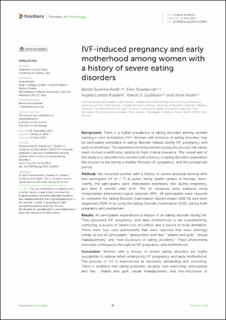| dc.identifier.citation | Sommerfeldt, B., Skårderud, F., Kvalem, I. L., Gulliksen, K. & Holte, A. (2023). IVF-induced pregnancy and early motherhood among women with a history of severe eating disorders. Frontiers in Psychology, 14, 1-13. doi: | en_US |
| dc.description.abstract | Background: There is a higher prevalence of eating disorders among women seeking in vitro fertilization (IVF). Women with a history of eating disorders may be particularly vulnerable to eating disorder relapse during IVF, pregnancy, and early motherhood. The experience of these women during this process has hardly been studied scientifically, despite its high clinical relevance. The overall aim of this study is to describe how women with a history of eating disorders experience the process of becoming a mother through IVF, pregnancy, and the postpartum period. Methods: We recruited women with a history of severe anorexia nervosa who had undergone IVF (n = 7) at public family health centers in Norway. Semi-openly, the participants were interviewed extensively first during pregnancy, and then 6 months after birth. The 14 narratives were analyzed using interpretative phenomenological analyses (IPA). All participants were required to complete the Eating Disorder Examination Questionnaire (EDE-Q) and were diagnosed (DSM-5) by using the Eating Disorder Examination (EDE), during both pregnancy and postpartum. Results: All participants experienced a relapse of an eating disorder during IVF. They perceived IVF, pregnancy, and early motherhood to be overwhelming, confusing, a source of severe loss of control, and a source of body alienation. There were four core phenomena that were reported that were strikingly similar across all participants: “anxiousness and fear,” “shame and guilt,” “sexual maladjustment,” and “non-disclosure of eating problems.” These phenomena persisted continuously throughout IVF, pregnancy, and motherhood. Conclusion: Women with a history of severe eating disorders are highly susceptible to relapse when undergoing IVF, pregnancy, and early motherhood. The process of IVF is experienced as extremely demanding and provoking. There is evidence that eating problems, purging, over-exercising, anxiousness and fear, shame and guilt, sexual maladjustment, and non-disclosure of eating problems continue throughout IVF, pregnancy, and the early years of motherhood. Therefore, it is necessary for healthcare workers providing services to women undergoing IVF to be attentive and intervene when they suspect a history of eating disorders. | en_US |

